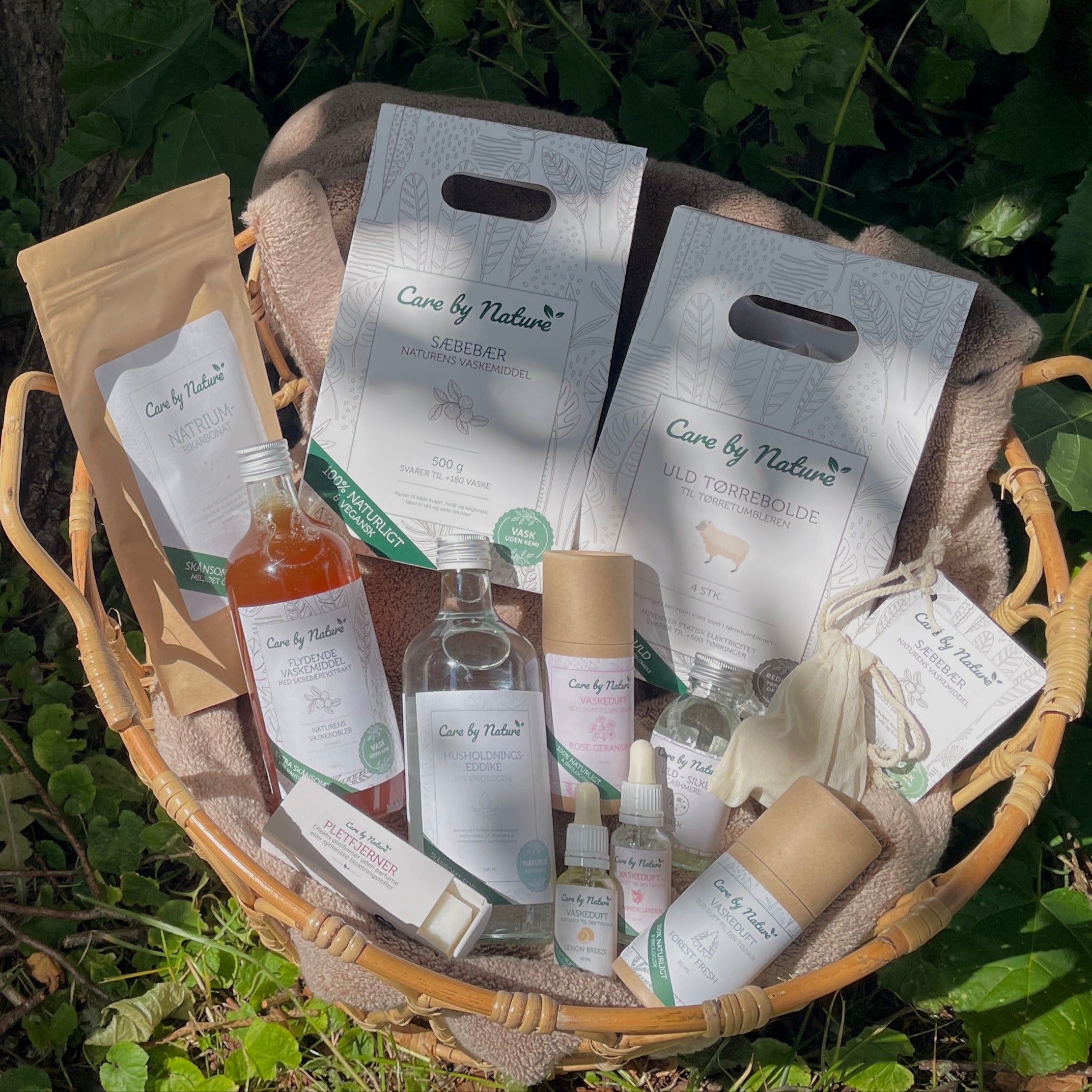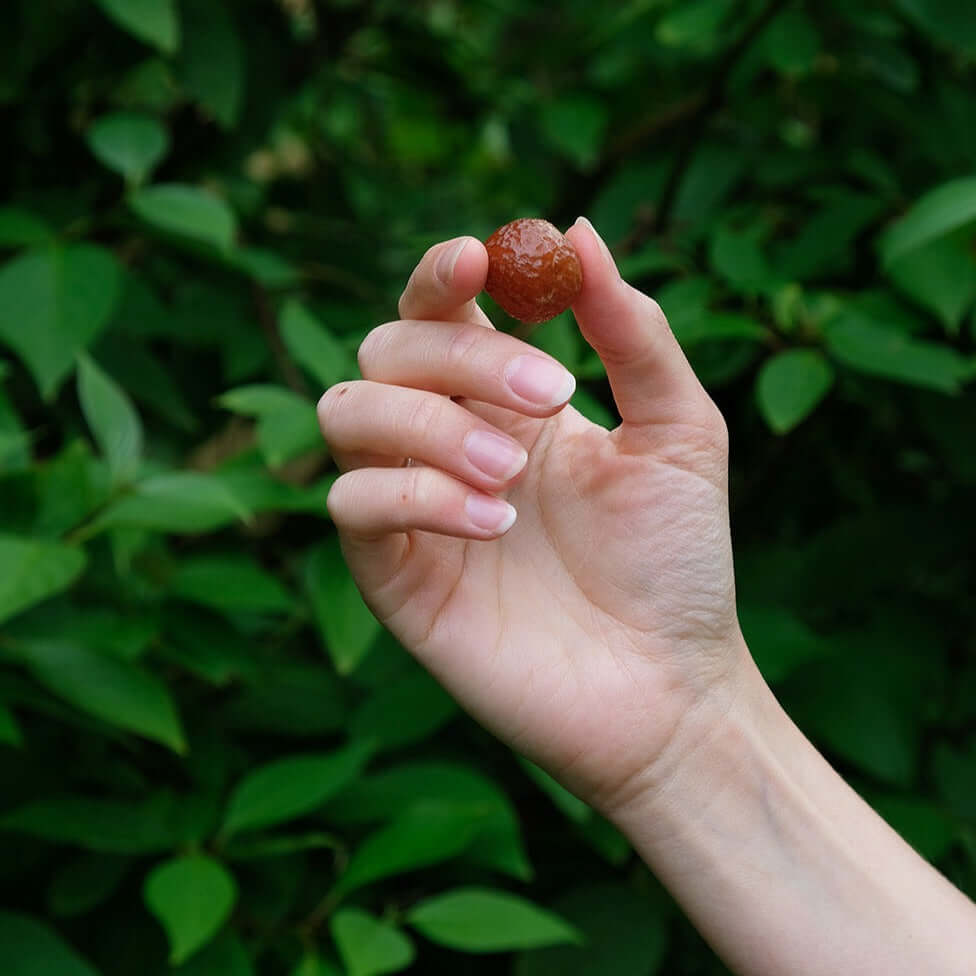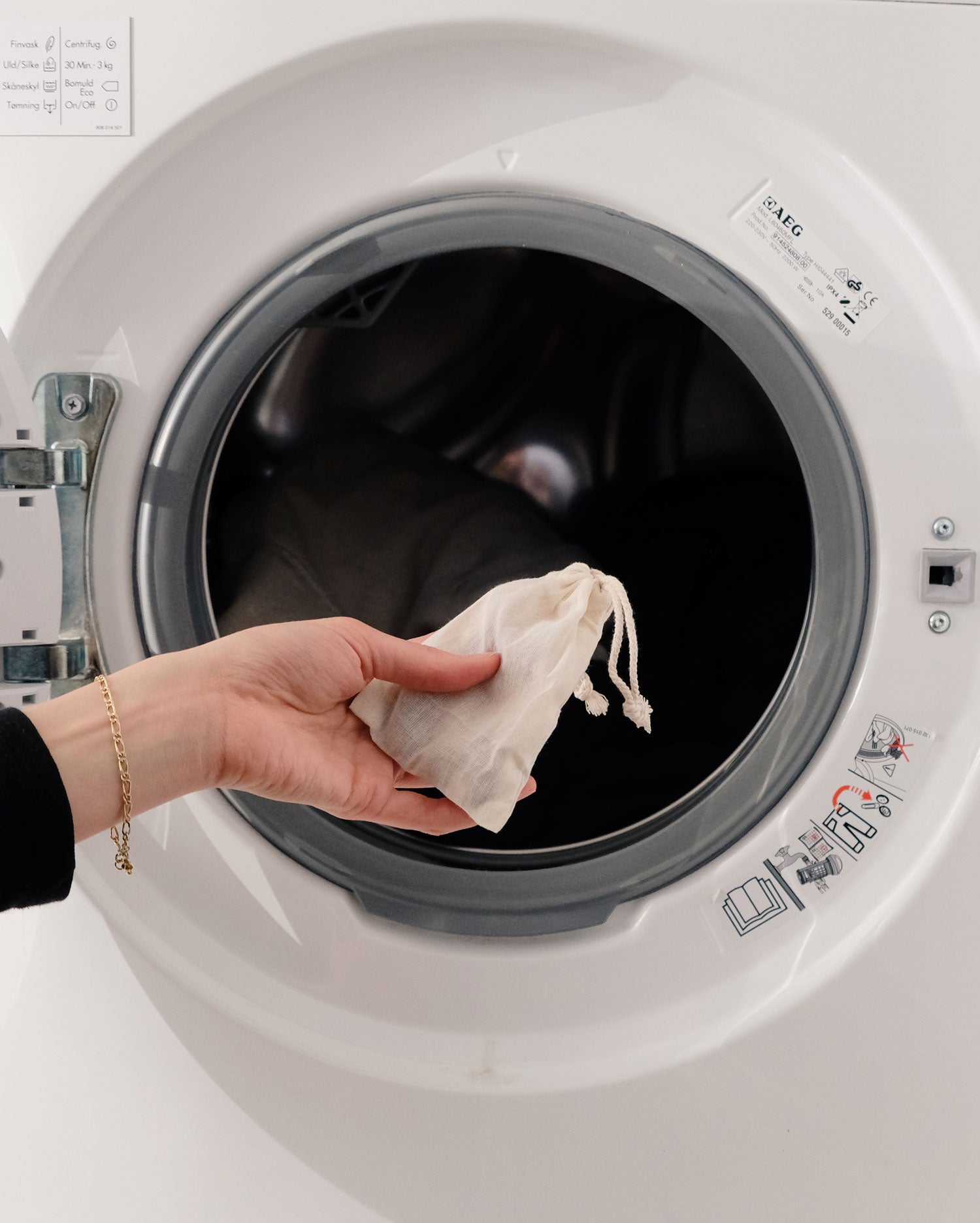About ours
Responsible production
Of soapberry
De forskellige tekstiler
Bomuld er slidstærkt, men kan hurtigt miste farve og form, hvis du vasker det for hårdt.
De meste bomuld kan sagtens blive rent ved 30–40 °C, selvom vaskelabelen ofte tillader højere temperatur. Når du vasker køligere, skåner du både fibrene og miljøet, samtidig med at du reducerer dit strømforbrug.
Pas desuden på dit bomuld ved at vaske med skånsomme vaskemidler, så det holder længere.
Vask skånsomt med sæbebær, se vores udvalg til tøjvasken her
👉 Tip: Fyld maskinen helt op, og hæng tøjet til tørre i stedet for at bruge tørretumbleren. Så holder det sig pænt i meget længere tid.
Uld er et naturligt og delikat materiale, som kræver særlig skånsom behandling for at bevare sin form, blødhed og holdbarhed. Uld er fantastisk til at holde dig varm om vinteren og kølig om sommeren. Men det kræver lidt kærlighed.
Læs også vores blogopslag om forskellige hensyn til de forskellige typer uld her
☝️Tip: Uld behøver sjældent vask. Hæng det i frisk luft, og lad naturen gøre arbejdet. Det sparer både vand og energi – og dit uldtøj dufter friskt bagefter.
Find Care by Nature uldvaskemiddel her
👉Brug altid et specialvaskemiddel til uld eller silke. Almindelige vaskemidler indeholder enzymer og stærke tensider, som kan nedbryde uldfibrenes naturlige struktur og gøre tøjet filtret eller stift.
👉Undgå skyllemiddel – det lægger sig som en hinde på fibrene og kan ødelægge uldens naturlige evne til at ånde og regulere varme.
👉Vask ved lav temperatur, typisk 30 °C, og altid på uldprogram, hvis maskinen har det. Programmet er designet til at minimere bevægelse og temperaturudsving, som ellers kan få ulden til at krympe eller filte.
👉Håndvask kan også være skånsomt, men sørg for at vandet ikke er for varmt og undgå at vride tøjet.
👉Undgå at gnide, vride eller strække uldtøj i våd tilstand – fibrene er ekstra sårbare, når de er våde.Pres forsigtigt overskydende vand ud med et håndklæde.
👉Tør fladt på et håndklæde, så tøjet ikke mister faconen.
Hvad man skal undgå ved uldvask:
🧴Ingen almindelige vaskemidler med enzymer (f.eks. protease), da de nedbryder uld.
🧴Ingen skyllemiddel, da det ødelægger fibrenes naturlige egenskaber.
🏜️Ingen høje temperaturer eller hurtige skift mellem varmt og koldt vand – det får ulden til at krympe.
🌀Ingen tørretumbler – varmen og bevægelsen får fibrene til at filte sammen.
Silke er en naturfiber fremstillet af silkesommerfuglens kokoner. Det er et let, stærkt og åndbart materiale, der føles behageligt mod huden og regulerer temperatur godt. Silke er dog sart, og derfor kræver det en nænsom vask, hvis det skal holde sig smukt og funktionelt.
☝️Tip: Silke behøver ikke vask efter hver brug. Luft det let, og du kan spare både vask og energi, samtidig med at tøjet holder længere.
Sådan vasker du silke skånsomt og miljøvenligt:
👉Vasketemperatur: Vask silke ved maks. 30 °C – gerne på et skåne- eller silkeprogram i maskinen. Hvis du vil være ekstra forsigtig, kan du vaske det i hånden.
👉Vaskemiddel: Brug altid et mildt vaskemiddel uden enzymer og blegemidler, da disse kan nedbryde silkeproteinerne.
Find vores uld-silke-cashmere vaskemiddel her
👉Centrifugering: Undgå høj centrifugering, da det kan ødelægge fibrene. Vrid aldrig silke, men pres forsigtigt vandet ud med et håndklæde.
👉Tørring: Silke må ikke tørretumbles. Hæng det til tørre på en bøjle i skyggen – direkte sollys kan falme farverne.
👉Strygning: Hvis stoffet skal glattes, så brug lav varme og gerne et viskestykke imellem strygejern og silke for at undgå skader.
De fleste træningstøjsprodukter er lavet af syntetiske materialer som polyester, elastan eller polyamid. De er udviklet til at transportere sved væk fra kroppen og tørre hurtigt, men de kræver skånsom vask.
👉 Tip: Vend sportstøj på vrangen før vask – det hjælper med at fjerne svedrester mere effektivt.
Almindelige vaskemetoder kan:
☝️ødelægge elasticiteten
☝️lukke fibrene, så de ikke længere ånder
☝️fastholde svedlugt i materialet
Sådan vasker du sportstøj – trin for trin
1. Vend tøjet på vrangen
Det beskytter farver og materialer, samtidig med at sved og bakterier fjernes mere effektivt.
2. Sorter vasketøjet
Vask sportstøj separat eller sammen med andet syntetisk tøj – undgå at blande med fx håndklæder eller bomuld, da det kan slide på fibrene.
3. Vælg den rigtige temperatur
Vask ved 30 °C eller maksimalt 40 °C.
Højere temperaturer kan skade elastan og funktionsmaterialer.
4. Brug det rigtige vaskemiddel
Vælg et mildt flydende vaskemiddel uden blegemiddel.
Brug gerne et specialmiddel til sportstøj, som er udviklet til at fjerne bakterier og lugt.
Undgå skyllemiddel – det lægger sig som en hinde på fibrene og forringer svedtransporten.
5. Skånsomt vaskeprogram
Brug et program til sportstøj eller syntetisk tøj, hvis din maskine har det. Ellers vælg skåneprogram med lav centrifugering.
6. Tørring
Hæng sportstøjet til tørre – det tørrer hurtigt af sig selv.
Undgå tørretumbler, da varmen ødelægger elasticiteten og funktionsegenskaberne.
FAQ – ofte stillede spørgsmål om vask af sportstøj
👉Hvordan får man svedlugt ud af sportstøj?
Vask hurtigt efter brug, brug specialvaskemiddel til sportstøj, og læg tøjet i blød i vand med lidt eddike inden vask, hvis lugten er genstridig.
👉Kan man bruge skyllemiddel til sportstøj?
Nej – skyllemiddel ødelægger materialets åndbarhed og gør, at lugt sætter sig lettere.
👉Ved hvilken temperatur skal man vaske træningstøj?
Normalt 30 °C, højst 40 °C. Højere temperaturer ødelægger elastiske fibre og funktionsegenskaber.
👉Kan sportstøj komme i tørretumbleren?
Det frarådes. Hæng det i stedet til tørre – det tørrer hurtigt og holder længere.
Hvidt tøj er klassisk og tidløst, men det kræver korrekt vask for at forblive lyst og pænt. Over tid kan hvide tekstiler blive grålige eller gule, hvis de ikke vaskes og behandles rigtigt.
☝️ Tip: Vask ikke altid ved høje temperaturer – lavere grader er oftest nok. Overvaskning ved 60 °C slider på fibrene og bruger unødvendig energi.
Sådan vasker du hvidt tøj skånsomt og miljøvenligt:
👉Sorter tøjet: Vask altid hvidt tøj for sig selv. Selv lyse farver kan afgive farve, som gør det hvide mat.
👉Vasketemperatur: De fleste hvide bomulds- og linnedprodukter bliver rene ved 40 °C. Kun stærkt snavset tøj, som viskestykker eller undertøj, kræver 60 °C. Ved lavere temperaturer sparer du energi og skåner fibrene.
👉Vaskemiddel: Brug et mildt vaskemiddel, og tilsæt 1–2 spiseskefulde natron (bikarbonat) direkte i vasken. Natron hjælper med at opløse pletter, fjerne lugt og holde tøjet naturligt lyst uden brug af hårde blegemidler.
Se vores milde, skånsomme og effektive naturlige vaskeprodukter, bl.a. vores natriumbikarbonat, her
👉Pletbehandling: Behandl pletter inden vask med en mild pletfjerner eller galdesæbe. Særligt fedt, kaffe og vin bør fjernes hurtigt.
Har du set vores pletfjerner her?
👉Tørring: Lufttørring i sollys er effektivt – solens UV-stråler virker naturligt blegende. Undgå dog for meget direkte sol på sarte materialer som silke eller viskose.
👉Opfriskning: Hvis hvidt tøj begynder at se gråt ud, kan du iblødsætte det i en opløsning af natron eller eddike før vask.
Syntetiske fibre er slidstærke og hurtigtørrende, men kan afgive mikroplast under vask.
Vasketemperatur: 30 °C er som regel nok.
Vaskemiddel: Almindeligt vaskemiddel i moderat mængde.
Miljøtip: Brug vaskepose til at reducere udledning af mikroplast.
Tørring: Lufttørring anbefales, da tørretumbler kan skade materialet.
👉 Tip: Vask syntetisk tøj separat fra naturfibre – det reducerer statisk elektricitet og fnugdannelse.
Linned er et stærkt naturmateriale, der er særligt godt til sommerbrug og boligtekstiler. Det bliver blødere ved brug, men kræver skånsom vask.
Vasketemperatur: 30–40 °C er tilstrækkeligt.
Vaskemiddel: Brug et mildt vaskemiddel uden optisk hvidt. Skyllemiddel frarådes.
Tørring: Lufttørring er bedst. Linned kan krølle, men det er en naturlig egenskab ved stoffet.
👉 Tip: Tag linned ud af maskinen, mens det stadig er let fugtigt – det gør det nemmere at glatte eller stryge.
Denim er bomuld med en særlig vævning, som gør stoffet slidstærkt. Hyppig vask kan dog slide på farven og formen.
Vasketemperatur: Vask sjældent og ved 30 °C. Vend tøjet på vrangen for at bevare farven.
Vaskemiddel: Mildt vaskemiddel uden blegemiddel.
Tørring: Lufttørring anbefales. Undgå tørretumbler for at bevare pasform.
👉 Tip: Fjern pletter på jeans med en fugtig klud i stedet for at vaske hele bukserne.
Bambus og viskose er regenererede fibre, som er bløde og behagelige, men svækkes i våd tilstand.
Vasketemperatur: Vask ved maks. 30 °C på skåneprogram.
Vaskemiddel: Brug mildt vaskemiddel.
Centrifugering: Lav centrifugering for at undgå skader.
Tørring: Lufttør på bøjle for at bevare formen.
👉 Tip: Brug vaskepose til bambus- og viskosetøj – det beskytter fibrene mod slitage i maskinen.
Mange er i tvivl om, hvordan man bedst vasker dyner. De er store, fyldige og ofte lavet af materialer, der kræver særlig pleje, så de holder sig rene, luftige og behagelige i lang tid.
👉Tjek altid vaskeanvisningen først. Nogle dyner tåler maskinvask, mens andre skal renses.
👉Fyld: Dun- og fiberfyld kan som regel vaskes i maskinen, hvis tromlen er stor nok (7 kg eller mere).
👉Temperatur: Vask normalt ved 40–60 °C afhængig af fyld og behov for hygiejne.
👉Vaskemiddel: Brug et mildt vaskemiddel uden enzymer og undgå skyllemiddel – det kan ødelægge fyldets evne til at isolere.
👉Tørring: Tør i tørretumbler ved lav til middel varme. Tilføj et par tennisbolde eller tørrebolde i tumbleren – det fordeler fyldet og holder dynen luftig. Sørg for, at dynen er helt tør, ellers kan der dannes mug eller dårlig lugt.
Hvorfor skal man vaske sin hovedpude?
Hovedpuder bruges hver nat og samler over tid sved, hudceller, støv og allergener. Uden regelmæssig vask kan puderne miste deres form, lugte ubehageligt og blive grobund for husstøvmider. Når du vasker dine hovedpuder rigtigt, holder de sig friske, hygiejniske og bevarer deres støtteevne længere. Det kræver dog, at du tager hensyn til pudens materiale – for dun, fiber og skum skal behandles på forskellige måder.
👉Dun- og fiberpuder: Vaskes som dyner, gerne to ad gangen for at balancere maskinen. Brug mildt vaskemiddel og tør i tørretumbler med bolde for at bevare formen.
👉Skum- eller memory foam-puder: Skal ikke vaskes i maskine. Aftør med en fugtig klud og luftes jævnligt. Betrækket kan ofte vaskes separat.
👉Hygiejne: Puder bør vaskes 2–4 gange om året for at fjerne sved, støv og allergener.
Vigtigt at huske:
Vask hovedpuder 2-4 gange om året
Share details about your shipping policies, item returns, or customer service.
Mere info følger
vask skånsomt og miljøvenligt
🫧Vask altid ved lavere temperaturer, når det er muligt🫧
🧴Brug kun den anbefalede mængde vaskemiddel – ofte er mindre nok🧴
👕Fyld vaskemaskinen helt op, men undgå at overfylde👕
🍃Lufttør fremfor at bruge tørretumbler 🍃
Med små justeringer kan du skåne dit tøj, forlænge dets levetid og gøre en positiv forskel for miljøet



